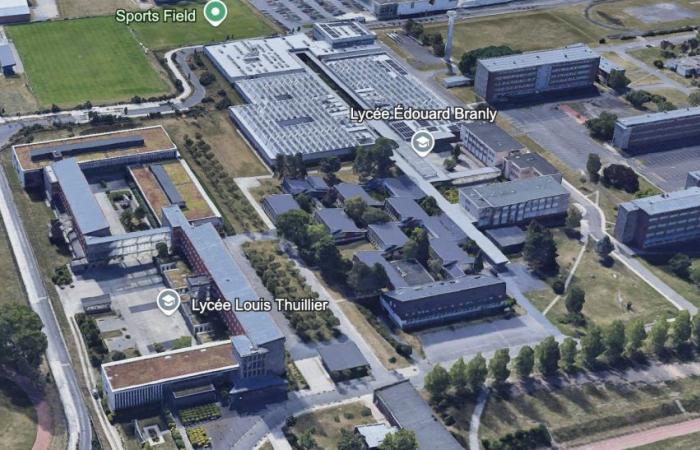
This Monday, January 13, in front of the entrance to the Louis-Thuillier and Edouard-Gand high schools, in the Amiens school campus, students warned about their study conditions. Without heating, classrooms have low temperatures, teachers also suffer.
At the beginning of January, it is cold outside. Winter brings its share of frosty mornings. But the cold also spreads to the classrooms of the Louis-Thillier and Edouard Branly high schools (in the school campus in Amiens) where the thermometer does not exceed 12 degrees. The same goes for boarding schools where students are forced to wear several layers of clothing to sleep.
Why this heating problem?
According to the Region, the administration which manages high schools, this is due to an aging system, which is more than 50 years old and which is not designed for the size of the school complex. On the 46 hectares, 3,500 learners and 600 staff work there every day.
What to do in these high schools?
The Hauts-de-France Region has taken emergency measures and mobilized all of its teams and specialized companies to improve the situation.
From this Monday, reinforcement of 5 technicians intervenes to continue manual sludge removal operations and continue to replace radiators that are no longer working. A similar intervention had already been carried out in December and spring 2024. Furthermore, the internationals have benefited from functional heating since last Wednesday evening.
In the short term, the Region's priority is to resolve the current difficulties and mobilize resources: replacement of radiators, doubling the number of sludge collectors, installation of additional expansion tanks and installation of clarifiers. Over the last 3 years, more than 729,000 euros have been committed by the Region for this work.
However, studies will also be carried out to consider a global energy renovation of the site.
To sustainably respond to these dysfunctions, the Region has decided to launch a new phase of in-depth studies. This work aims to rethink all or part of the internal network, by modifying its structure. This work, estimated at more than 5 million euros, will be carried out in several phases. The Region will make every effort to quickly initiate a first phase for the buildings most affected by these malfunctions.
What ambition for Hauts-de-France high schools?
Since the end of 2023, Laurent Rigaud has been vice-president of the Regional Council in charge of Education and High Schools. Discussion about the future of high schools in Hauts-de-France.
Many young people are affected by the phenomenon of electronicism? Is the region planning any actions?
L.R : When we are no longer integrated into everyday life because we don't know how to use digital technology or tools, that's a problem. Particularly for high school students who have access to the digital work environment (ENT), but who are unable to use it. So, that's a topic for us. In the region, with the Canopée network, we organize face-to-face and remote interventions to combat this phenomenon. But, in my opinion, if we only support high school students, we will only have done half the work: families must also be able to take charge of these tools.
-What work is the region planning to aim for energy efficiency in high schools?
L.R : High school operating budgets have exploded. We will have to support high schools in adopting good ecological actions to save energy. Investments will be focused on renovation. Many school buildings are affected. And these investments will now be crossed with our devices Rev 3 (editor's note: a collective dynamic initiated almost ten years ago by the Hauts-de-France Region and the Hauts-de-France Chamber of Commerce and Industries to promote a more sustainable and more united region).
Rehabilitation projects or creation of establishments in 2024?
L.R : New projects are underway and others still under discussion. But we must always ask ourselves the question: what is the high school of tomorrow? It is no longer a question of renovating high schools as we did 20 years ago. Redoing the same classes, the same buildings, that’s not enough. We need to renovate differently and we need to renovate faster. The high school of 2030 must resemble what will be found in businesses. The model of classes where we set up tables, a blackboard and where we sit there for hours is evolving.
Will security in high schools be strengthened?
L.R : Yes, following the Arras disaster, we put an additional €10 million on the table, in addition to the €8 million, for safety in order to speed up as many projects as possible. Every week, high school projects are launched or completed in Hauts-de-France. Sometimes, it involves installing a security turnstile, renovating a gate, adding a camera… sometimes, it is necessary to completely redo reception halls which are poorly positioned.
What are the aids deployed by the region for high school students?
L.R : The generation card is the best known: €500 the first year, €55 the following years. 210,000 high school students had activated their card in November (editor's note: the region has 261,000 high school students). For young people in (financial) difficulty, the Region can support them with catering and transport. There is also specific aid for mobility for professional high school students, on work-study or apprenticeship programs. The Region finances 90% of their driving license.
The Region has also established a partnership with family planning…
L.R : Indeed, this partnership which existed only in Pas-de-Calais and Aisne was extended in September 2023 to all departments of Hauts-de-France. The idea: to raise awareness of family planning and its actions (editor's note: its role is in particular to listen and guide a request for Voluntary Termination of Pregnancy). The high school student must be able to call, ask questions, go to family planning.





